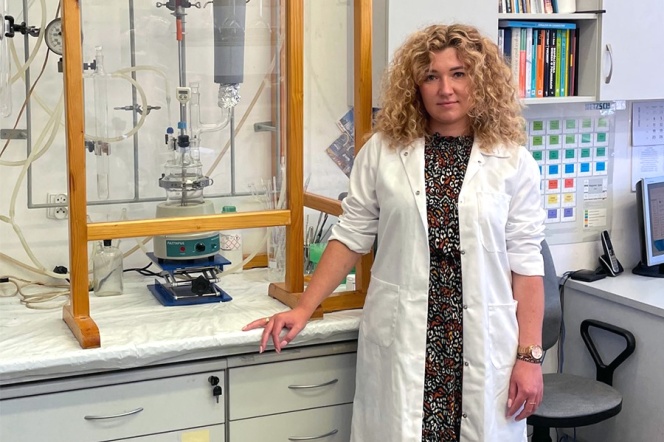Date added: 2022-09-08
Polyurethanes from corn derivatives – an alternative to petrochemicals

– Polyurethane materials stand out among plastics in a peculiar way. Due to their mechanical properties, durability included, they are used in various industries, starting from medical, through automotive industry, to construction, often for extremely different applications. However, polyurethanes are quite expensive mainly due to the prices of intermediate materials used for their production and the prices of crude oil. Therefore, alternative sources of intermediate materials are explored, such that would reduce the production costs and exceed the intended use and application of polyurethane materials, which has gained new meaning in the context of current global situation – says Paulina Parcheta-Szwindowska, PhD from the Department of Polymer Technology at the Faculty of Chemistry of Gdańsk Tech, the author of the invention together with Prof. Janusz Datta.
Bio-based intermediate products
One of the two main components of polyurethanes which influence the properties of the obtained product are polyols. Researchers from Gdańsk Tech have developed linear polyester bio-polyols and a method of their preparation using natural compounds: bio-based dicarboxylic acids, bio-glycols and their mixtures.
Bio-polyols obtained in this way can be an intermediate for the production of polyurethane elastomers, used for production of phone cases, elastic watch straps and toy components, car seals, mattress fillings, shoe soles, coating materials, paints, varnishes and adhesives. Additionally, they can also be applied in the construction industry for the production of PUR foam, e.g. with acoustic vibration damping properties.
No need to change the production lines
– Our bio-polyols can be obtained on the production lines currently used in companies that produce polyester polyols, which enables immediate implementation of the patent in the industry – emphasizes the researcher. – The difference between petrochemical polyols used so far by companies and our product is that they are obtained in petrochemical processes, whereas we use monomers from fermentation of corn under controlled conditions for synthesis. We use them to synthesize polyester polyols, which can have the same parameters as petrochemical polyols.
An alternative to fossil fuels, lower CO2 emissions
Paulina Parcheta-Szwindowska emphasizes that using monomers produced from biomass is very important for the production of modern polymer materials, including biodegradable plastics, not only because it is an alternative to chemicals derived from fossil raw materials, but also because it is a way to reduce emissions of carbon dioxide. One of the examples of such solutions is biorefinery processing of maize, where starch separated from the wet-ground plant undergoes the processes of conversion to chemical substances.
Within the scope of the currently carried out Titatnium project, Paulina Parcheta-Szwindowska explores the possibility of extending patent protection of the invention to Europe.
– We hope that our bio-polyols will find consumers in European countries producing polyester polyols. Our innovation will help reduce the carbon footprint and is a way to become independent from oil resources in this area – says the researcher.
Appreciated at international fairs
The researcher is also conducting a research project financed under the Innovation Incubator 4.0 competition entitled "Thermoplastic polyurethane elastomers obtained by using bio-based polyester polyols", which aims to support scientists in commercialization of research results and searching for business partners. First companies potentially interested in implementing the invention have already appeared.
Thanks to funding from the Incubator, Gdańsk Tech team took part in the International Fair of Inventions and Innovations Show INTARG 2022, during which Paulina Parcheta-Szwindowska, PhD and Prof. Janusz Datta received three medals: gold for the "Method for obtaining reduced flammability cast polyurethanes", silver for "Linear polyester bio-polyols and the method of their preparation", and bronze for " Method for obtaining linear bio-based polyester polyols ", and the special AWARD of World Invention Intellectual Property Association (WIIPA) for "Method for obtaining reduced flammability cast polyurethanes" (with Izabela Zagożdżon and Joanna Niesiobędzka).
Additionally, thanks to grants from the Radium program, talented students supervised by Paulina Parcheta-Szwindowska, PhD work on the synthesis and characterization of transparent polyurethane elastomers.
The researcher will also continue and develop research on polyester polyols as part of a research internship funded within the Europium program.



EUROPIUM
Project name: "Visit at Freie Universitaet Berlin"
Funding: PLN 37 100
Project implemented within Advanced Materials Center
RADIUM
Project name: "Influence of radiochromic dyes on selected properties of polyurethane elastomers"
Funding: PLN 23 100
Project implemented within Advanced Materials Center
Project name: "Transparent polyurethane elastomers - synthesis and characteristics"
Funding: PLN 23 650
Project implemented within Advanced Materials Center
TITANIUM
Project name. "Linear polyester bio-polyols and the method of their preparation"
Funding: PLN 18 000

